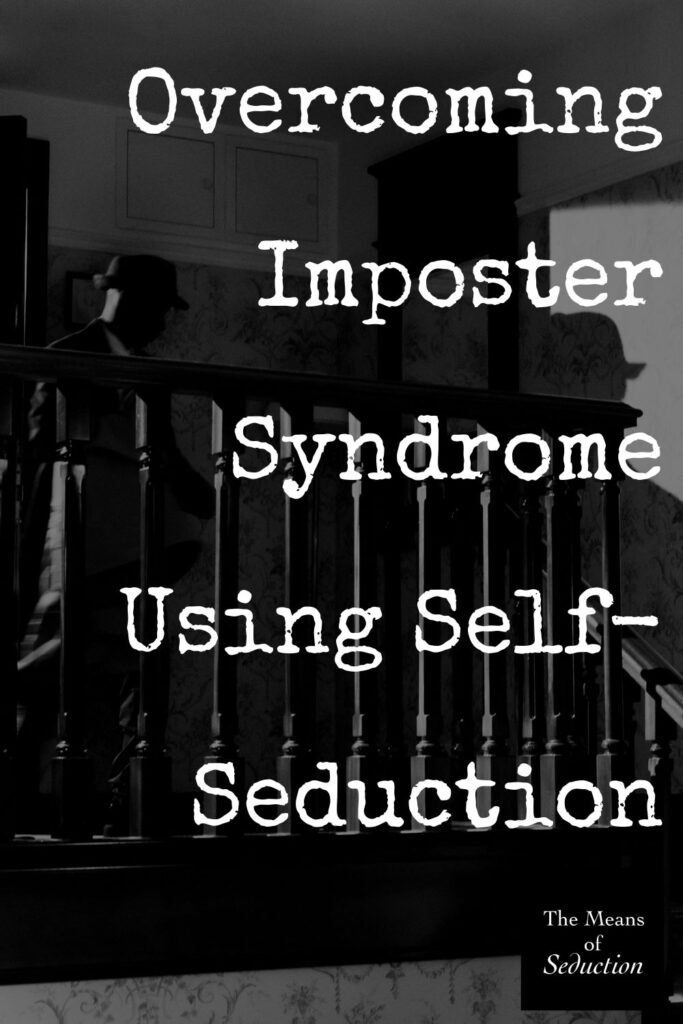Overcoming imposter syndrome using self-seduction is an active, engaging way to reclaim your sense of self and re-introduce your potential to the world.

Imposter Syndrome
What is imposter syndrome?
The short answer: Feeling like an imposter in your everyday life.
Impostor syndrome describes a psychological pattern in which individuals doubt their own accomplishments, attributes, or abilities; they experience the ingrained fear of being outed or exposed as a “fraud” in their everyday lives. Even when presented with consistent evidence to the contrary, those ensnared by imposter syndrome will write a lot of their abilities and successes off as “luck” or the result of others, rather than recognizing their own capabilities and individual roles in creating and curating their positive attributes and successes.
What causes imposter syndrome? Perfectionism, social comparison, the fear of failure, or high personal standards that lead to unrealistic expectations and disappointments may be to blame. From a sociological standpoint, imposter syndrome is a symptom of social constructionism (i.e., it highlights how societal norms, expectations, and standards of success contribute to individuals doubting their own achievements).
Self-Seduction: The Antidote to Imposter Syndrome
Self-seduction refers to the process of intentionally cultivating one’s sense of self-confidence, self-empowerment, and self-worth. To self-seduce, you need to look inwards. Self-introspection will help you understand where you are starting from and what you need to build on.
To those struggling with imposter syndrome, it often feels like the “successful” part of themselves is a fractured piece that exists separately from the rest of the self. The “imposter” is really just the version of themselves that appears when greatness is required and leaves like a fairy godmother at midnight, before anyone notices the helping hand, and is an illusion of their fear. Self-seduction encourages you to coax that fractured piece of yourself back over, to reclaim it and give it a seat at the table. The part of you responsible for greatness is you, not an imposter.
To self-seduce (i.e., influence yourself as you would an outsider with evidence of your confidence, ability, and worth), you will need to embrace your imperfections, rewrite your narratives, and focus on developing your craft and skills.
1. Embracing Your Imperfection:
By acknowledging and accepting your flaws, you dismantle the foundation of self-doubt that imposter syndrome generally thrives upon. This shift in perspective allows you to acknowledge your attributes, abilities, and accomplishments as sources of strength and pride. Having a realistic and accepting view of yourself, both strengths and weaknesses, will make it harder to see yourself as a “fraud”.
2. Rewriting Your Narrative:
Overcoming imposter syndrome requires the writing of a new narrative that ignores external judgement and validation. Attribute your successes to your tenacity, skill, and ability to network effectively, while embracing your failures as a necessary part of your growth. Evolving your self-concept, striving for self-assuredness, and reframing your narrative internally (into a story of accomplishment through grit) will help you present a more seductive image to the world. Practice comfortably marketing yourself to others; sell people on the narrative you most wish to be known for. Fake it – speak it – until you become it. In your own story, you can never be the imposter. You are the main character.
3. Refining Your Craft:
Engaging in skill development activities and refining your craft encourages you to proactively involve yourself in your growth and see its results through the manifestation of your potential. Engaging in skill development is an actionable step towards self-improvement that will not only increase your self-confidence and strengthen your resume but, most importantly, counteract feelings of inadequacy. Proving to yourself that you are who you claim to be will confirm and restore your sense of identity.
Examples:
- Study and take that test you think you can’t pass, as many times as you need to, until you finally pass it. Refine your practices and habits each time. In the process, you will learn, fail, and succeed.
- Write down all your ideas for that adventure story you keep daydreaming about, until you complete the book you always wanted to write. Write, delete, edit, and evolve. In the process, you will learn, fail, and succeed.
Follow through on your goals because you are (and should be) your biggest and most worthwhile investment. This process will serve as a consistent reminder that you already have the capabilities to learn, grow, and achieve, challenging the internal voice that might have always said otherwise. Overcoming imposter syndrome requires active refinement and confirmation.
Conclusion
Looking to take the transformative journey to overcoming imposter syndrome? Let the means of self-seduction alleviate you of your self-doubts and help you take advantage of your full potential for your own advancement. The part of you responsible for your greatness is YOU, all of you (even amid doubts), and not some imposter.
